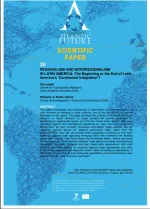Regionalism and Interregionalism in Latin America: The Beginning or the End of Latin America’s ‘Continental Integration’?

Scientific paper, nº. 20
This paper investigates the development of regionalism and inter-regionalism in Latin America as pertains to trade relations, one of the key drivers of regional integration in the region. The paper develops the outlines of the thesis that ‘Latin America’ or ‘South America’ no longer provide the optimal geography for constituting an appropriate region, and that new 'ocean basin regions' offer more promising regional and interregional trajectories for Latin American countries to pursue than do their currently conceived land-based ‘trade regions’. By ‘remapping’ national figures for bilateral commercial trade culled from the UNCOMTRADE data set, we provide initial quantitative evidence of new Latin American regional trade dynamics emerging within the continent’s two flanking ocean basin regions – the Pacific Basin and the Atlantic Basin – where new forms of ‘non-hegemonic’ and ‘maritime-centered’ regionalisms are being articulated and developed. The paper concludes that new ‘ocean basin regionalisms’ offer Latin America alternative options for pursuing regional trade agreements and other forms of inter-regional trade integration which, while remaining complementary to the current sub-continental and continental regionalisms, and could become a new guiding frame for Latin American regionalism.